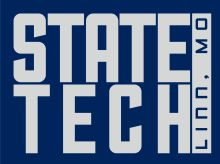State Technical College of Missouri


Selected Programs at State Technical College of Missouri
Explore programs at State Technical College of Missouri. This list is curated by SkillPointe to match skills-based industries and careers that don't require a four-year degree.
Browse Training Programs (19)
Architectural Drafter
Drafting and Design Engineering Technology, A.A.S.
The Drafting and Design Engineering Technology (DDT) program of State Technical College of MO is thorough and comprehensive, with a balanced mix of...
View Program
Civil Engineering Technician
Civil Engineering Technology, A.A.S.
The Civil Engineering Technology (CVT) program at State Technical College of MO prepares graduates to fill an important role in the development and...
View Program
Construction Equipment Operator
Heavy Equipment Operations
The Heavy Equipment Operations program is designed to produce operators trained in the major classifications of earth moving equipment. The program...
View Program
Electrician
Electrical Distribution Systems, A.A.S.
The Electrical Distribution Systems program at State Technical College of MO prepares individuals to climb wood pole structures, build and maintain...
View Program
HVAC Technician
Heating, Ventilation, & Air Conditioning Technology
The Heating, Ventilation, & Air Conditioning Technology program is a center of excellence for teaching alternative energy technicians to install...
View Program
Heavy Equipment Mechanic
Heavy Equipment Technology, A.A.S.
The Heavy Equipment Technology program prepares students to perform maintenance, troubleshooting, and rebuilding of the major components of earth...
View Program
Welder
Welding Technology, A.A.S.
As long as there is metal, there will always be a need for qualified welders. Welding is the most common way of permanently joining metal parts. In...
View Program
Nuclear Technician
Nuclear Technology, A.A.S.
The Nuclear Technology program offers the student a unique opportunity to obtain state-of-the-art training that will put the graduate in demand by any...
View Program
Dental Hygienist
Dental Assisting Technology
Dental assistants are specially-trained, technically-skilled members of the dental team. Students are trained in the steps required for a variety of...
View Program
Nurse - LPN / LVN
Practical Nursing Technology
The Practical Nursing Technology program is an eleven month, three semester program with 1,290 total instructional hours including a minimum of 360...
View Program
Physical Therapy Assistant
Physical Therapist Assistant, A.A.S.
The Physical Therapist Assistant (PTA) program is designed to equip the graduate with the necessary skills and training to become employed in various...
View Program
Radiology Technician
Medical Radiologic Technology, A.A.S.
The Medical Radiologic Technology program is designed to equip graduates with the necessary skills and knowledge to become competent healthcare...
View Program
IT Support Specialist
Networking Systems Technology
The mission of the Networking Systems Technology program is to provide students with the technical and interpersonal skills needed to enter the field...
View Program
Network and Computer Systems Administrator
Networking Systems Technology
The mission of the Networking Systems Technology program is to provide students with the technical and interpersonal skills needed to enter the field...
View Program
Machinist
Precision Machining Technology, A.A.S.
In our program, students are taught how to select the right machining process, plan that process, and operate computer numerical control (CNC) and...
View Program
Aircraft Mechanic
Aviation Maintenance, A.A.S.
The Aviation Maintenance program prepares individuals for employment in the aircraft maintenance industry. Aircraft mechanics are employed by the...
View Program
Auto Body Technician
Automotive Collision Technology, A.A.S.
The Automotive Collision Technology program of State Technical College of MO prepares students to pursue opportunities in many related careers which...
View Program
Auto Mechanic
Automotive Technology, A.A.S.
State Technical College of MO offers the person who wants to become a skilled automotive service technician the opportunity to work in one of the best...
View Program
Powersports Technology
The Powersports Technology program prepares individuals to perform maintenance, troubleshooting, and overhaul of the major components of powersports...
View Program
Diesel Mechanic
Medium/Heavy Truck Technology, A.A.S.
The Associate of Applied Science degree program in Medium/Heavy Truck Technology is designed to prepare skilled technicians to service medium and...
View Program
Address
One Technology Drive
Linn, MO 65051-9607
Linn, MO 65051-9607
Phone number
573-897-5000